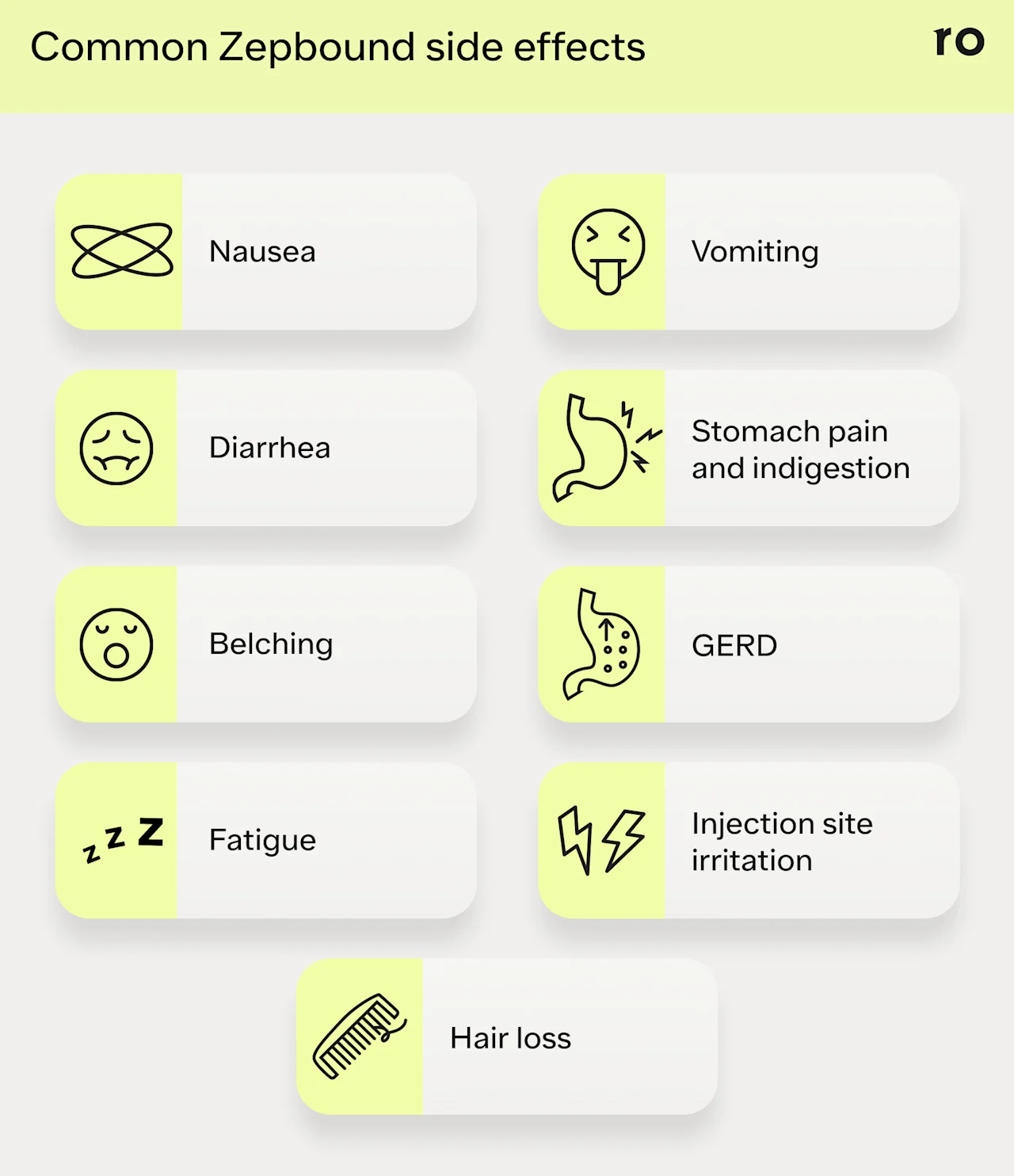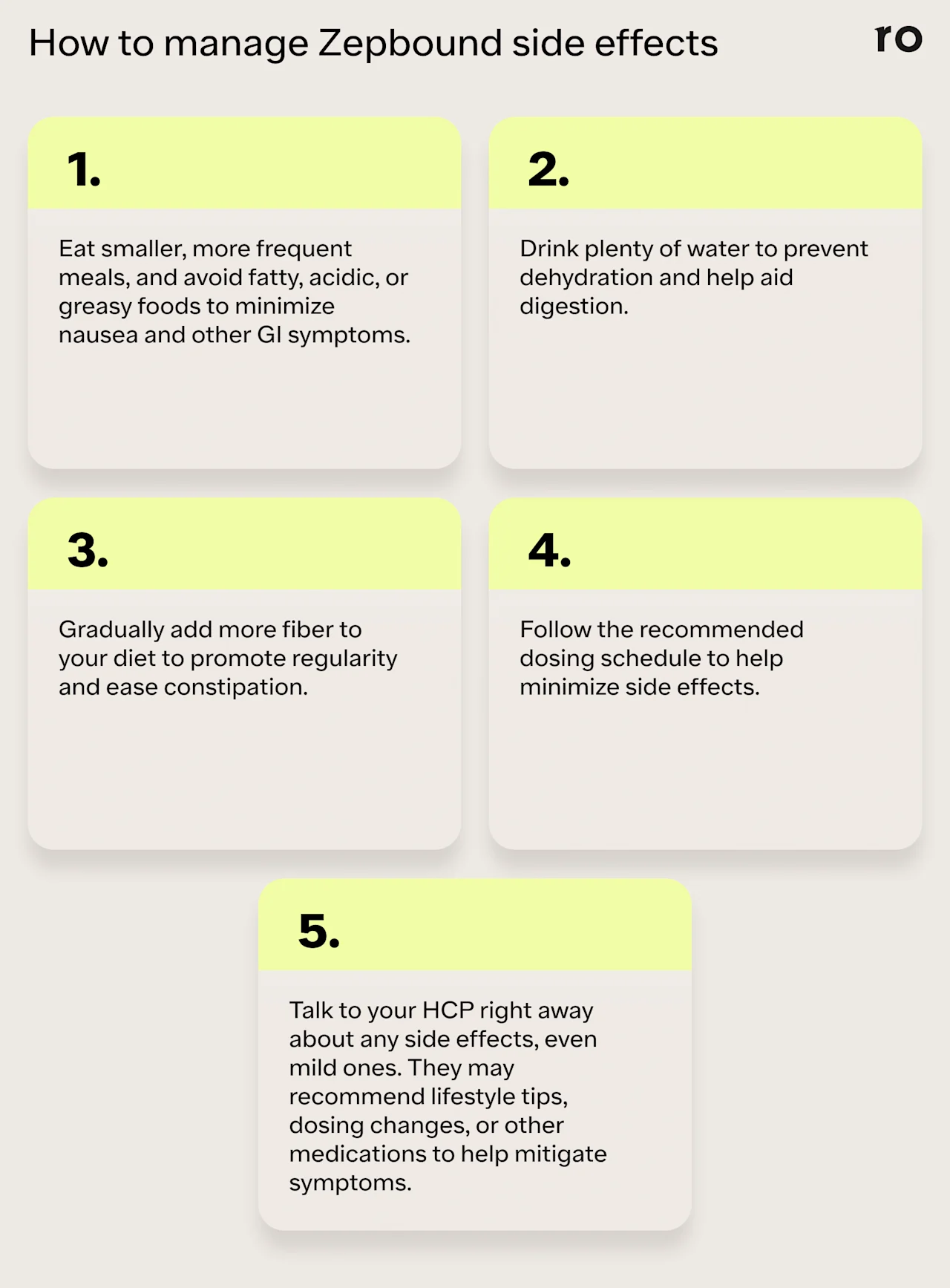Key takeaways
Zepbound (tirzepatide) is a dual-action GLP-1/GIP receptor agonist that can help promote weight loss and treat obstructive sleep apnea in people with obesity.
As with any medication, Zepbound may cause some potential side effects. The most common side effects are gastrointestinal (GI) issues like nausea, vomiting, and diarrhea.
Common Zepbound side effects tend to be mild and go away over time. Eating smaller meals, staying hydrated, and avoiding certain foods may help ease GI symptoms if they occur.
In rare cases, serious side effects may also occur. Your healthcare provider should monitor you closely to help prevent possible complications.
Here's what we'll cover
Key takeaways
Zepbound (tirzepatide) is a dual-action GLP-1/GIP receptor agonist that can help promote weight loss and treat obstructive sleep apnea in people with obesity.
As with any medication, Zepbound may cause some potential side effects. The most common side effects are gastrointestinal (GI) issues like nausea, vomiting, and diarrhea.
Common Zepbound side effects tend to be mild and go away over time. Eating smaller meals, staying hydrated, and avoiding certain foods may help ease GI symptoms if they occur.
In rare cases, serious side effects may also occur. Your healthcare provider should monitor you closely to help prevent possible complications.
Zepbound (tirzepatide)is one of the game-changing weight loss drugs that have come on the market in recent years to help with chronic weight management in people with obesity and overweight. Among buzzy health news headlines, Zepbound holds court with similar medications, such as Ozempic, Wegovy, Mounjaro, Saxenda, and more.
Like any medication, Zepbound may come with potential side effects, though not everyone who takes this medication will experience them. The most common side effects of Zepbound include gastrointestinal (GI) issues like nausea, vomiting, diarrhea, and constipation.
The good news is that GI side effects tend to be mild and manageable, and they typically subside as your body adjusts to the medication. If you do experience mild side effects, your healthcare provider can offer tailored solutions to help ease any discomfort.
Read on to learn more about common Zepbound side effects, how to manage them, what to know about rare but serious side effects, and when to contact your healthcare provider for support.
What is Zepbound?
To understand Zepbound's side effects, it’s helpful to understand what Zepbound is and how it works.
Zepbound is an injectable prescription drug that the US Food and Drug Administration (FDA) approved in 2023 for chronic weight management in adults with obesity or overweight with at least one weight-related condition (such as high blood pressure, type 2 diabetes, or high cholesterol). In 2024, Zepbound was also approved to treat obstructive sleep apnea (OSA)in adults with obesity.
Zepbound is a glucagon-like peptide-1 and glucose-dependent insulinotropic polypeptide (GLP-1/GIP) receptor agonist. The medication works by mimicking the naturally occurring GLP-1 and GIP hormones in your body to help aid with weight management.
GLP-1. Produced in the small intestine, this gut hormone can help increase insulin secretion, reduce appetite, and slow digestion.
GIP. Also produced in the intestines, GIP works alongside GLP-1 to help keep appetite in check, stimulate insulin secretion, and control blood sugar.
Zepbound comes in a pre-filled single-dose pen or a single-dose vial that requires the use of a needle and a syringe. To take the medication, you inject Zepbound just underneath the skin on the same day each week.
Zepbound comes in six dosage strengths: 2.5 mg, 5 mg, 7.5 mg, 10 mg, 12.5 mg, and 15 mg. Your healthcare provider will likely start you on the lowest dose and then may gradually increase it over time, depending on how well you tolerate the medication. This incremental approach can help your body adjust to the medication and may help to minimize common side effects.
Common side effects of Zepbound and how to manage them
While Zepbound has undergone extensive testing and is generally considered safe, it may come with some potential side effects.
The most common side effects of Zepbound include:
Nausea
Vomiting
Abdominal pain
Indigestion
Injection site reactions (rash)
Belching
Gastroesophageal reflux disease (GERD)
Let’s take a closer look at each potential symptom and explore ways to help reduce the side effects of Zepbound.

Nausea or vomiting
A 2023 meta-analysis of six clinical trials looked at reports of GI side effects from more than 4,500 people with type 2 diabetes taking tirzepatide at 5, 10, and 15 mg doses. In that analysis, about 20% of patients experienced some nausea, while about 9% experienced vomiting.
Although researchers are still studying why nausea and vomiting may occur for some people taking Zepbound, they have some theories. One of the ways that Zepbound works for weight loss is by slowing gastric emptying, or the rate at which food moves from the stomach to the small intestine. This slowed transit time may lead to feelings of fullness, which could lead to stomach upset.
How to manage nausea and vomiting:
Consider eating smaller meals spaced throughout the day.
Avoid fatty or greasy foods, which can exacerbate symptoms.
If nausea or vomiting persists, talk to your prescribing healthcare provider. They may recommend prescription or over-the-counter (OTC) anti-nausea or antiemetic medications to help ease symptoms.
Hear from Ro patients
Ro members taking branded GLP-1 medications were paid for their testimonials.
Diarrhea or constipation
Zepbound may cause both diarrhea and constipation. According to the same meta-analysis, diarrhea may be more common than constipation with Zepbound. The researchers found that the incidence rate of diarrhea was about 16%, while for constipation, it was nearly 3%. In a 2022 phase 3 clinical trial, incidences of these symptoms were generally more common in people on higher dosages of the medication.
Both diarrhea and constipation may occur because Zepbound slows down gastric emptying. This change in gut motility can cause potentially unpleasant digestive side effects.
How to manage diarrhea:
Drink water and other clear fluids, such as tea or broth, to prevent dehydration.
Stick to a BRAT diet and opt for bland foods, such as rice or plain toast, to help reduce stomach discomfort.
Avoid intense spices and fatty foods, at least until your symptoms resolve.
How to manage constipation:
Drink plenty of water throughout the day to help with digestion.
Slowly increase fiber intake with high-fiber foods like berries, oats, and beans.
Ask your healthcare provider about taking a fiber supplement, such as psyllium husk, to help promote regularity.
If diarrhea or constipation do not improve or become severe, talk to your healthcare provider as soon as possible.
Abdominal pain, indigestion, belching
Slowed gastric emptying can also lead to some indigestion or abdominal discomfort, such as distention, belching, or pain.
In an analysis of three studies looking at adverse events of people on tirzepatide, the researchers found that abdominal distention occurred in about 16% of patients on the highest dosage (15 mg), while abdominal pain occurred in about 8% and belching in about 16%. Approximately 15% experienced general abdominal discomfort.
How to manage indigestion and abdominal pain:
Chew food thoroughly and eat slowly.
Avoid drinking through a straw and consuming carbonated beverages, both of which can cause excess gas in the digestive tract.
Zepound works best in conjunction with lifestyle changes. Sometimes dietary changes, such as increasing fiber, can cause stomach discomfort until your body gets used to your new eating habits. Keeping a food and symptom journal can help you determine foods that are triggers for discomfort and whether that discomfort resolves over time as your body adjusts.
Mild abdominal discomfort may resolve on its own. But if you experience intense distention or pain, reach out to your healthcare provider right away.
Gastroesophageal reflux disease (GERD)
Delayed gastric emptying can also lead to an increase in stomach acid and pressure, which can affect the lower esophageal sphincter. The lower esophageal sphincter helps prevent the backflow of stomach contents into your esophagus. But pressure can cause the sphincter, or valve, to malfunction, causing acid reflux.
When this backflow occurs regularly, the condition is called gastroesophageal reflux disease (GERD).
How to manage GERD:
Some dietary changes, such as avoiding spicy or overly acidic foods, may help ease GERD symptoms.
Eating slowly, chewing thoroughly, eating smaller meals, and avoiding lying down for two to three hours after meals or snacks may also help.
If acid reflux is persistent, consult your healthcare provider. They may recommend certain medications to help treat the condition.
Injection-site reactions
Injection-site reactions may also occur after administration of Zepbound, though this is rare. Reactions might include swelling, redness, irritation, or a rash.
How to manage injection site reactions:
Follow your healthcare provider's instructions for how to inject Zepbound to help reduce the chances of irritation.
Switch or alternate injection-site locations each time you administer your medication to help prevent redness or discomfort.
If injection-site reactions become bothersome or persist, talk to your healthcare provider about potential solutions and whether you should apply a topical cream or ice pack post-injection.
Fatigue
Fatigue may also occur while taking Zepound. You may be eating fewer calories than you’re used to, which can lead to feeling lower energy while your body adjusts. Additionally, delayed gastric emptying could cause feelings of sluggishness.
How to manage fatigue:
Increase physical activity slowly over time to help combat fatigue. Even a short walk each day can help improve mood, sleep, and overall energy.
Add more high-protein foods to your diet, such as eggs, Greek yogurt, nuts, and poultry, which may help boost energy levels.
Prioritize getting a good night’s rest. Stick to a regular sleep schedule and practice good sleep hygiene by limiting caffeine intake, avoiding screens before bedtime, and keeping your bedroom dark and cool.
In some cases, Zepbound-induced fatigue can be a sign of low blood sugar (hypoglycemia), though this may be more common in people with type 2 diabetes. If you notice other related symptoms, such as shakiness, irritability, nausea, or hunger, contact your healthcare provider right away. Low blood sugar can be dangerous if not treated.
Before you start taking Zepbound, talk to your healthcare provider about what to do if you experience low blood sugar. Your treatment protocol may differ based on your underlying conditions, medications you’re taking, and more.
Hair loss
Some patients have reported hair loss while on tirzepatide. Researchers don’t yet know the exact causes, but a potential reason is that GLP-1 medications may impact follicles and hair growth cycles. Another possibility is that the weight loss associated with these medications may cause stress to the body, which can lead to increased hair shedding.
How to manage hair loss:
Talk to your healthcare provider. They may want to run tests to check for underlying conditions, change your dosage, check your micronutrient levels for any deficiencies, and more to help find a solution.
Be sure to eat a nutrient-dense diet with a variety of lean proteins, high-fiber foods, and healthy fats to help support your overall wellbeing and promote hair growth.
Stress may cause short-term hair loss or shedding. Finding creative ways to manage stress may help minimize this side effect and support your weight loss goals.
Ask your healthcare provider about prescription treatments, such as minoxidil (Rogaine), that may help with hair regrowth.
How long do Zepbound side effects last?
Common potential side effects of Zepbound tend to occur when you are first starting the medication. These side effects may lessen or go away as your body adjusts to your current dosage over a few weeks. You may also experience side effects when you first start taking a higher dosage.
It’s important to follow your provider’s recommended dosing schedule for Zepbound. Skipping doses or starting at higher dose strengths may increase your risk for GI side effects.
If you continue to experience side effects, your provider may keep you at a lower dosage for longer to give your body more time to adjust. If side effects become severe or intolerable, you and your provider may decide that discontinuing the medication or trying an alternative to Zepbound is the best choice for your health needs and goals.

Rare but serious side effects
Rare but serious side effects may also occur while taking Zepound.
Stop using the medication and talk to your healthcare provider right away if you experience any of the following:
Allergic reactions (including anaphylaxis). Symptoms may include swelling in the face and/or throat, difficulty breathing, wheezing, rash, feeling lightheaded, or rapid heartbeat.
Inflammation of the pancreas (pancreatitis). Symptoms may include severe abdominal pain, pain that radiates from the upper abdomen to the back, fever, and vomiting.
Gallbladder inflammation or gallstones. Symptoms may include sudden sharp or stabbing pain in your upper right abdomen or the center of your abdomen, fever, nausea, and vomiting.
Kidney problems (kidney failure). People with existing kidney problems may experience a worsening of their symptoms if they experience dehydration while taking Zepbound. Kidney injury may also occur in those without kidney disease.
Low blood sugar (hypoglycemia). Dangerously low blood sugar may be more common in people with type 2 diabetes or who are taking other medications to lower blood sugar while on Zepbound. Symptoms may include dizziness or lightheadedness, mood changes, sweating, hunger, confusion, weakness, headache, rapid heartbeat, or feeling jittery.
Pulmonary aspiration during general anesthesia or deep sedation. Zepbound causes a delay in gastric emptying, meaning that food stays in your stomach for longer periods. Pulmonary aspiration (when food or liquid from the stomach enters the lungs) has occurred in some people taking GLP-1 medications, including Zepbound, while undergoing surgery requiring sedation, even when instructed to fast before the surgery. If you have a planned major surgery requiring sedation, reach out to your provider for instructions.
Severe gastrointestinal adverse reactions. In rare cases, Zepbound may cause gastroparesis, an extreme slowing or even stopping of gastric emptying, which could lead to an intestinal blockage. Symptoms of gastroparesis may mimic other common GI side effects and can include persistent or severe nausea and vomiting, indigestion, constipation, regurgitating undigested food, acid reflux, and bloating.
Suicidal behavior and ideation. In very rare cases, Zepbound and other weight loss injections may cause suicidal ideation or actions, but it’s not clear why this may happen. According to a preliminary evaluation of existing research, there is no causal link between Zepbound and depression or suicidal behavior. Despite this low risk, you should still pay attention to any mental health changes, especially changes in your mood, behaviors, thoughts, or feelings. Talk to your healthcare provider right away if you have any mental changes or symptoms that are new, worse or that concern you.
Thyroid C-cell tumors. Zepound carries a boxed warning for an increased risk in certain types of thyroid tumors. In rodent studies, Zepbound caused a dose-dependent and treatment-duration-dependent increase in thyroid C-cell tumors. Researchers do not know whether Zepbound causes thyroid C-cell tumors in humans. Symptoms may include sudden hoarseness, a lump in the throat, and trouble swallowing.
Vision changes. Symptoms may include blurred vision, floaters, or spots. For people with type 2 diabetes who also have a history of diabetic retinopathy (a condition that can cause blood vessel damage in the retina), Zepbound may worsen symptoms. People with a known history of diabetic retinopathy should be closely monitored while taking this medication.
Who should not take Zepbound?
Not everyone is a candidate for taking Zepbound. You should not use the medication if:
You are pregnant, breastfeeding, or planning to become pregnant
You have severe gastrointestinal disease
You are allergic to an ingredient in Zepbound
You have a personal or family history of certain thyroid cancers, including medullary thyroid carcinoma and multiple endocrine neoplasia syndrome type 2 (MEN 2)
You have a personal or family history of pancreatitis
Zepbound may also interact with some medications, including some oral medications (such as oral birth control), diabetes drugs, and other GLP-1s. For this reason and because of the increased risk for potential rare side effects in certain populations, be sure to tell your healthcare provider about your current medications and supplements, underlying conditions, and family medical history. They can help determine if Zepbound is a safe and appropriate medication for you based on your unique health history.
When to contact a healthcare provider
Your healthcare provider should provide regular monitoring while you’re taking Zepbound, so don’t hesitate to reach out if you experience side effects—even mild ones. They can help find solutions to minimize or ease symptoms, which may include lifestyle modifications, prescription or OTC medications, or keeping you at a lower medication dose until your body adjusts.
Contact them right away if you experience bothersome, persistent, or worsening side effects. They may recommend that you stop taking Zepbound or recommend a different weight loss injection.
Seek immediate medical attention if you experience severe side effects, including:
Signs of an allergic reaction, such as rash, swelling, or breathing trouble
Intense or stabbing abdominal pain
Diarrhea that doesn’t resolve
Ongoing constipation or the inability to pass gas
Bottom line
Zepbound can be an effective tool for weight loss, but it may come with potential side effects. Talk to your healthcare provider to understand common and rare side effects and how to manage them.
The most common side effects of Zepbound may include GI issues like vomiting, nausea, constipation, diarrhea, and abdominal discomfort.
Zepbound side effects tend to be mild and occur when first starting the medication or increasing your dosage.
Lifestyle modifications may help ease symptoms. Eating smaller meals, staying hydrated, avoiding spicy or fatty foods, and following your provider’s dosing recommendations may help minimize side effects.
Zepbound may cause more serious side effects, though these are very rare. Stop taking Zepbound and seek immediate medical attention if you experience symptoms of a serious adverse reaction, such as swelling, sudden sharp abdominal pain, difficulty breathing, or severe, persistent vomiting or diarrhea.
Frequently asked questions (FAQs)
Is Zepbound bad for the kidneys?
Zepbound contains a warning label about potential acute kidney injury. However, tirzepatide, the active ingredient in Zepbound, has also been shown to have the potential to protect the kidneys from the development of chronic kidney disease. Your healthcare provider can help determine if Zepbound is appropriate for you based on your health history.
What happens if you eat too much on Zepbound?
If you eat too much while taking Zepbound, you may have feelings of fullness that last for a while. You might also experience gastrointestinal symptoms, such as nausea, vomiting, constipation, diarrhea, abdominal discomfort, abdominal distention, belching, acid reflux, and more.
What medications should not be taken with Zepbound?
Before taking Zepbound, be sure to discuss all the medications and supplements you take with your healthcare provider. Zepbound may interact with drugs, such as those for diabetes, oral birth control, and other medications or supplements for weight loss.
What happens when you stop Zepbound?
If you stop taking Zepbound, you may regain the weight you’ve lost, notice an increase in appetite, or experience worsening insulin resistance or blood sugar control.
DISCLAIMER
If you have any medical questions or concerns, please talk to your healthcare provider. The articles on Health Guide are underpinned by peer-reviewed research and information drawn from medical societies and governmental agencies. However, they are not a substitute for professional medical advice, diagnosis, or treatment.
Zepbound Important Safety Information: Read more about serious warnings and safety info.
Ozempic Important Safety Information: Read more about serious warnings and safety info.
Wegovy Important Safety Information: Read more about serious warnings and safety info.
Mounjaro Important Safety Information: Read more about serious warnings and safety info.
Saxenda Important Safety Information: Read more about serious warnings and safety info.
References
Barakou, I. Sakalidis, K. E., Abonie, U. S., Finch T, et al. (2023). Effectiveness of physical activity interventions on reducing perceived fatigue among adults with chronic conditions: a systematic review and meta-analysis of randomised controlled trials. Scientific Reports, 13(1), 14582. doi: 10.1038/s41598-023-41075-8. Retrieved from https://pubmed.ncbi.nlm.nih.gov/37666869/
Bi, Y., Zhang, L., Li, X., et al. (2021). Contributing factors of fatigue in patients with type 2 diabetes: A systematic review. Psychoneuroendocrinology, 130, 105280. doi: 0.1016/j.psyneuen.2021.105280. Retrieved from https://pubmed.ncbi.nlm.nih.gov/34049018/
Bosch, C., Carriazo, S., Soler, M. J., et al. (2022). Tirzepatide and prevention of chronic kidney disease. Clinical Kidney Journal, 16(5), 797. doi: 10.1093/ckj/sfac274. Retrieved from https://pubmed.ncbi.nlm.nih.gov/37151412/
Buontempo, M. G. & Santos, B. T. (2025). Exploring the hair loss risk in glucagon‐like peptide‐1 agonists: Emerging concerns and clinical implications. Journal of the European Academy of Dermatology and Venereology, 39(2), 263-264. doi: 10.1111/jdv.20512. Retrieved from https://onlinelibrary.wiley.com/doi/10.1111/jdv.20512
Chen, W., Cai, P., Zou, W., et al. (2024). Psychiatric adverse events associated with GLP-1 receptor agonists: a real-world pharmacovigilance study based on the FDA Adverse Event Reporting System database. Frontiers in Endocrinology, 15, 1330936. doi: 10.3389/fendo.2024.1330936. Retrieved from https://pmc.ncbi.nlm.nih.gov/articles/PMC10882716/
Cintineo, H. P., Arent, M. A., Antonio, J., et al. (2018). Effects of protein supplementation on performance and recovery in resistance and endurance training. Frontiers in Nutrition, 5, 83. doi: 0.3389/fnut.2018.00083. Retrieved from https://pmc.ncbi.nlm.nih.gov/articles/PMC6142015/
Dash, S. (2024). Opportunities to optimize lifestyle interventions in combination with glucagon-like peptide-1-based therapy. Diabetes, Obesity, and Metabolism, 26(Suppl 4), 3-15. doi: 10.1111/dom.15829. Retrieved from https://pubmed.ncbi.nlm.nih.gov/39157881/
Eli Lilly and Company. (2022). Highlights of Prescribing Information: Zepbound (tirzepatide) injection. Retrieved from https://uspl.lilly.com/zepbound/zepbound.html
Ioniță-Mîndrican, C. B., Ziani, K., Mititelu, M., et al. (2022). Therapeutic benefits and dietary restrictions of fiber intake: a state of the art review. Nutrients, 14(13), 2641. doi: 0.7759/cureus.46091. Retrieved from https://pubmed.ncbi.nlm.nih.gov/37908927/
Jastreboff, A. M., Aronne, L. J., Ahmad, N. N., et al. (2022). Tirzepatide once weekly for the treatment of obesity. New England Journal of Medicine, 387(3), 205-216. doi: 10.1056/NEJMoa2206038. Retrieved from https://www.nejm.org/doi/full/10.1056/NEJMoa2206038
Karrar, H. R., Nouh, M. I., Nouh, Y. I., et al. (2023). Tirzepatide-induced gastrointestinal manifestations: a systematic review and meta-analysis. Cureus, 15(9), e46091. doi: 0.7759/cureus.46091. Retrieved from https://pubmed.ncbi.nlm.nih.gov/37908927/
Meng, Z., Yang, M., Wen, H., et al (2023). A systematic review of the safety of tirzepatide-a new dual GLP1 and GIP agonist — is its safety profile acceptable? Frontiers in Endocrinology, 14, 1121387. doi: 10.3389/fendo.2023.1121387. Retrieved from https://pubmed.ncbi.nlm.nih.gov/37051199/
Mishra, R., Raj, R., Elshimy, G., et al. (2023). Adverse events related to tirzepatide. Journal of the Endocrine Society, 7(4), bvad016. doi: 10.1210/jendso/bvad016. Retrieved from https://pubmed.ncbi.nlm.nih.gov/37051199/
Müller, T. D., Finan, B., Bloom, S. R., et al. (2019). Glucagon-like peptide 1 (GLP-1). Molecular Metabolism, 30, 72-130. doi: 10.1016/j.molmet.2019.09.010. Retrieved from https://pubmed.ncbi.nlm.nih.gov/31767182/
Parkman, H. P., Sharkey, E., McCallum, R. W., et al. (2020). Constipation in patients with symptoms of gastroparesis: analysis of symptoms and gastrointestinal transit. Clinical Gastroenterology and Hepatology : The Official Clinical Practice Journal of The American Gastroenterological Association, 20(3), 546. doi: 10.1016/j.cgh.2020.10.045. Retrieved from https://pmc.ncbi.nlm.nih.gov/articles/PMC8079462/
Stacher, G., Lenglinger, J., Bergmann, H., et al. (2000). Gastric emptying: a contributory factor in gastro-oesophageal reflux activity? Gut, 47(5), 661. doi: 10.1136/gut.47.5.661. Retrieved from https://pmc.ncbi.nlm.nih.gov/articles/PMC1728126/
U.S. Food & Drug Administration (FDA). (2024). Update on FDA’s ongoing evaluation of reports of suicidal thoughts or actions in patients taking a certain type of medicines approved for type 2 diabetes and obesity. Retrieved from https://www.fda.gov/drugs/drug-safety-and-availability/update-fdas-ongoing-evaluation-reports-suicidal-thoughts-or-actions-patients-taking-certain-type
Wharton, S., Davies, M., Dicker, D., et al. (2022). Managing the gastrointestinal side effects of GLP-1 receptor agonists in obesity: recommendations for clinical practice. Postgraduate Medicine, 134(1), 14–19. doi: 10.1080/00325481.2021.2002616. https://pubmed.ncbi.nlm.nih.gov/34775881/ Retrieved from https://pubmed.ncbi.nlm.nih.gov/34775881/














